Bolivia and Colombia

Mark Wood, Research Advisor
Maria Patricia Ariza-Velasco is Fourth Deputy Attorney before the Council of State, Procuraduria General de la Republica de Colombia. Ms. Ariza-Velasco reviewed the evolution and nature of religious freedoms as found in the Colombian constitution, statutes and case law. She discussed how these freedoms impact everyday life in Colombia in areas such as marriage, education, military service and in the guarantees of freedom of conscience. She stated that the assumption always favors the freedom of religion.
Ninoska Lazarte, Councilwoman, Municipal Council of Cochabamba City, Bolivia, gave a brief description of the religious composition of the Bolivian population. She stated that in the future this information will be more difficult to obtain. Beginning with this November’s census, questions will no longer be asked respecting religious affiliations. In theory Bolivians enjoy legally protected freedom of religion. In practice, these freedoms are being reduced every day. The teaching of religion in schools is increasingly restricted. The government has begun to tax churches and organizations that serve orphans. She showed a video of a speech by Bolivian president Evo Morales wherein he condemns religion. She spoke of how it is becoming unsafe for religious leaders to even walk the streets, sharing the example of a Catholic leader who was assaulted in her hometown of Cochabamba. She stated that peoples of various religious persuasions are now uniting in their efforts to face government persecution.